Does Sugar From Beets Taste Any Different Than Cane Sugar?
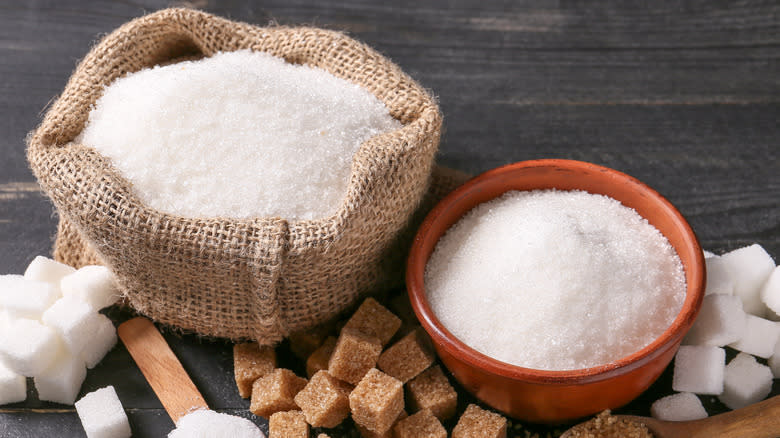
Have you ever wondered what the difference between beet sugar and cane sugar might be? As crystallized and refined sucrose, cooking ingredients don't get simpler than white sugar — it's hard to imagine that there would be any substantial difference between the effectively 100% sucrose crystals created from two different plants. At the same time, however, it's almost as hard to imagine that there wouldn't be any notable differences between sugar made from a grass that grows in warm climates and a root vegetable cultivated in cooler, more moderate regions.
The short and simple answer is that the differences between beet sugar and cane sugar are minute and generally irrelevant in everyday cooking. The long answer is that while the chemical and nutritional composition of the end product is nearly identical, the different refining processes of beet sugar and cane sugar result in subtle differences that may be of concern to detail-oriented chefs and bakers. Additionally, there's a chance that some sugars might not be strictly vegan by everyone's standards despite containing no animal products. Between the manufacturing processes, history, and health concerns, there's a lot to know about the differences between beet sugar and cane sugar.
Read more: Cake Hacks Every Baker Will Wish They Knew Sooner
What Is Cane Sugar?
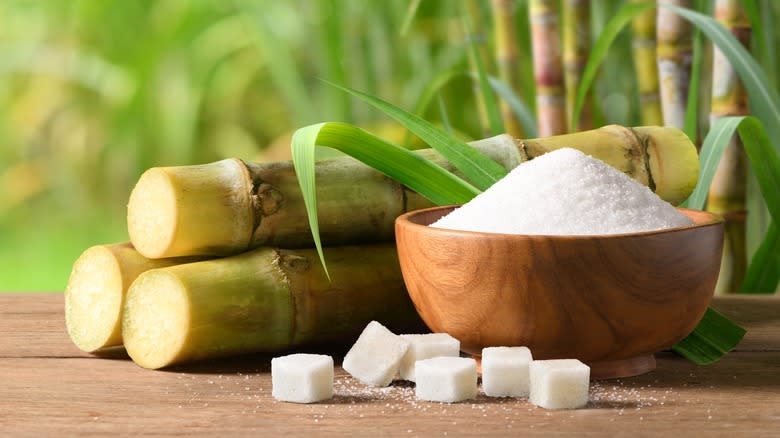
Cane sugar refers to sugar extracted from the sugarcane plant, which is by far the oldest of the two main sources of plain sugar. First domesticated as early as 8000 BCE in New Guinea, sugarcane has been one of the most enduring crops in the history of humanity and the primary source of sugar for the global population throughout the past 2000 years. In more recent centuries, the lengthy history of cane sugar has been irreparably marred by the extensive slave labor involved in its production in 18th and 19th century America — but cane sugar remains the most used source of sugar and comprises 80% of the global market.
The modern cane sugar refining process is a multi-step procedure that involves extracting the sugar juice or syrup from the sugarcane plant and then removing the moisture and other impurities to crystallize it into plain sugar. Mature sugarcane stalks are harvested and taken to sugar mills, where they're crushed to extract the sugarcane juice: a liquid blend of sucrose, water, and impurities. This juice is first clarified via multiple steps involving sulfur dioxide vapor, a slurry of calcium hydroxide, and a period of boiling and evaporating. Then, the clarified syrup is further evaporated to form sugar crystals, after which the crystals and the natural molasses are spun in a centrifuge and separated via rotational force. The sugar crystals are then dried, granulated, and packaged into the familiar bags of sugar you can find at grocery stores.
What Is Beet Sugar?
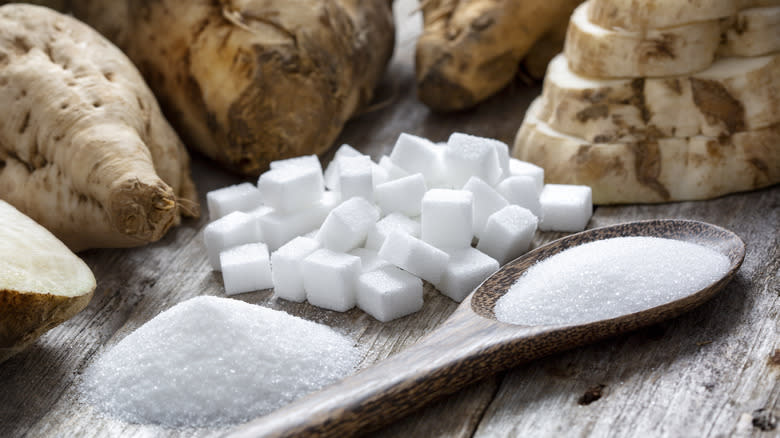
In contrast to the prehistoric origins of domesticated sugarcane, the use of sugar beets to produce sugar is a relatively modern invention that only spans a few centuries into the past. The high sugar content in beets was first discovered by a German chemist in the 18th century, which led to experimental sugar beet factories in Europe that became the foundation of the sugar beet industry as it exists today. While commercial sugar beet production initially struggled to find a foothold in America in the 19th century, just over half of the domestic sugar product today is sourced from sugar beets.
When it comes to the refining process, beet sugar goes through a more or less identical procedure as cane sugar save for the initial extraction process. Where sugarcane is crushed and milled for its juice, sugar beets have to be washed and cut into thin slices or french-fry-like strips. The sugar juice is extracted from the cut sugar beet via diffusion, where the beet pieces are placed in a large specialized diffuser tank that rotates the sugar beet within hot water, pushing the sugar downwards and lifting the remaining beet pulp to the top. The result is raw sugar beet juice that's taken from the diffuser tank to undergo more or less the same clarification, crystallization, and molasses separation processes as cane sugar to produce plain white sugar.
Beet Sugar Has A Unique Earthy Aroma
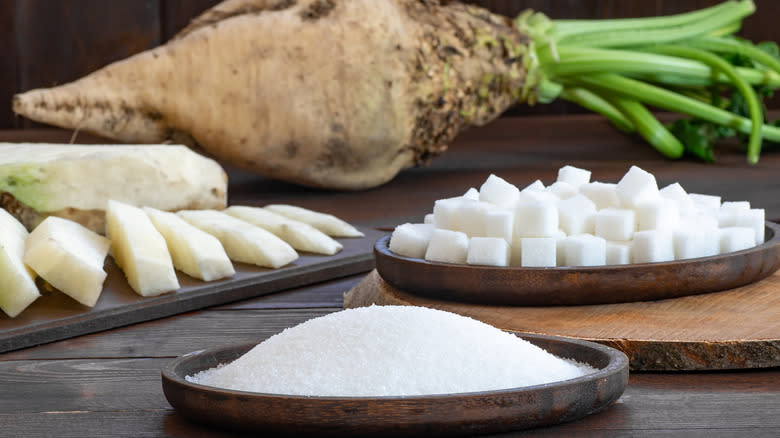
For the most part, the taste differences between plain granulated cane sugar and plain granulated beet sugar will be nearly imperceptible to the average person due to the more or less identical chemical composition of the two products. However, a focused taste test of the two might reveal minor differences in flavor profile that may or may not affect the kind of dishes you intend to use them in. By many accounts — including one academic study published by the Institute of Food Technologists — beet sugar has a characteristic earthy aroma, while cane sugar may carry lighter, sweeter, and almost fruity notes in comparison.
Another study on the taste differences in products made with beet and cane sugar -- published by the same institution -- also revealed that, while the taste differences could be observed in simple syrups made from beet and cane sugar, they couldn't be identified in more advanced products like sugar cookies, whipped cream, and iced tea. It seems that the taste difference is subtle enough to disregard in regular cooking and baking — the two sugars are identical in nutritional profile and effects on health as well, offering very little practical reasons to differentiate between the two.
Brown Sugar Is Usually Made From Sugarcane
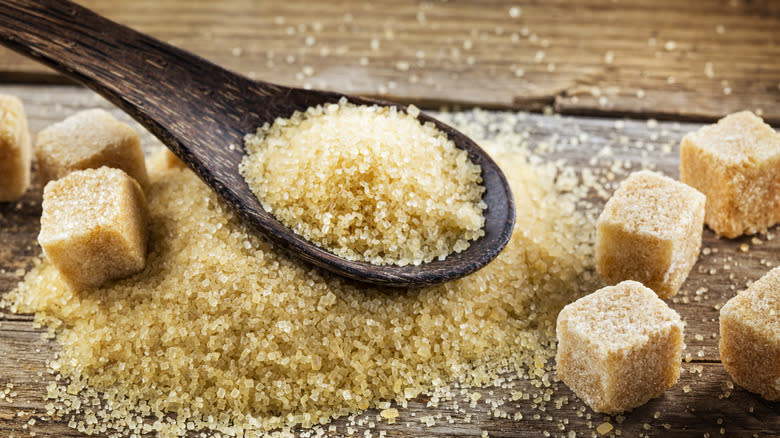
When it comes down to comparing different kinds of sugars and their different properties, it's crucial to dispel a common misconception regarding brown sugar's perceived health benefits over white sugar. Contrary to popular belief, most brown sugar isn't inherently healthier than white sugar, as it's essentially just refined white sugar with molasses reintroduced into the mix. The misconception often arises from the brown color of raw sugar, a less processed variant containing some natural molasses before packaging. Unfortunately, raw sugar is also not healthier than white sugar just by virtue of being less processed — it seems that all sugar is just sugar, and according to the American Heart Association, you should be watching your intake regardless of what kind.
One interesting thing to note is that while the refining processes of beet sugar and cane sugar are more or less identical after the initial extraction, it's only the molasses of cane sugar that's used to create commercially available brown sugar. The subtly bitter, earthy aroma of beet sugar is much stronger in its natural molasses, making it unsuitable for cooking and baking purposes in general. That's why the only kinds of "brown" sugar you'll find will be made from sugarcane, including raw sugar, light brown sugar, and dark brown sugar.
Cane Sugar Is Sometimes Processed With Animal Bones
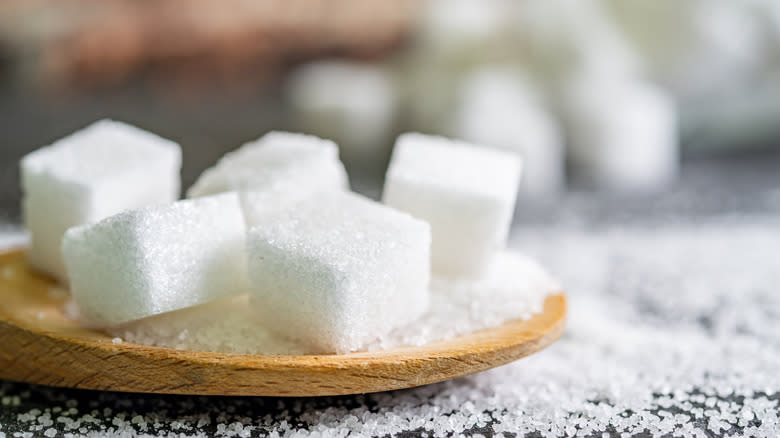
You may have heard that the sugar you use might not be vegan — and while sugar is touted to contain zero animal products or byproducts, this may or may not be true depending on your personal definition of vegan as well as the brand of sugar you're using. The point of contention rests in the fact that cane sugar is often filtered through bone char — ground and roasted cattle bone powder that's also sometimes called "natural carbon" — in the final stages of refinement to decolorize the sugar. Depending on your personal definition of or reasons for being vegan, this might disqualify cane sugar from your daily diet and consumer habits entirely.
The good news is that not all refined cane sugars use bone char for decolorization. There are a number of companies that offer granulated white sugar that hasn't been filtered through bone char. Furthermore, all raw sugar by default doesn't need bone char filtering, making products like Sucanat and turbinado sugar completely free of any animal product involvement. Finally, no variety of beet sugar undergoes bone char filtering, making it a viable choice across the board. When in doubt, look up or contact the manufacturer of your sugar of choice to verify any bone char usage or whether the sugar is sourced from sugarcane or sugar beets.
Read the original article on Daily Meal.

